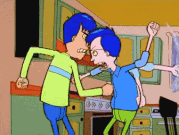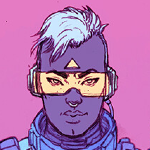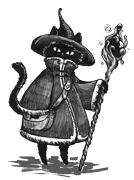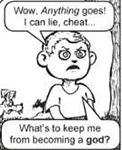|
the_sea_hag posted:Hello! I have a project that's in its very early stages (it's been an RP line since last October and I'm working with my cowriter to get it in shape as a romance novel) and I'd like to see if I can get any feedback on how I should talk about the character before I start seeking out a sensitivity reader. I am a queer cis woman. I'm nonbinary trans so I don't have this exact experience (and everyone has a different experience anyway, like sparksbloom said) but I'll give my 2 cents. a) As a trans person, if I picked up the book because, say, I saw it tagged somewhere as having a trans character, I'd probably be pretty disappointed if that character wasn't even out to themself until the end or the epilogue. I'd probably just be thinking "where is the trans character?" the whole time. (I've definitely read books that get touted as having gay/bi main characters when it ends up just being nothing but a vague line of dialog near the end of the story where the character says/implies they aren't straight and it's almost always pretty disappointing.) If you're foreshadowing her coming out through the whole book that might work better and you wouldn't leave people wondering, but you do run the risk of writing a trans coming out story as a cis person, and that's tricky ground to tread at best. WRT to your question of how to refer to the character to others, I think for the purpose of talking about the character with sensitivity readers and people who are helping with editing and the like (basically, people who are reading this not as a casual reader) I'd definitely use she/her since they would know the character's identity anyway. As far as with casual readers, I don't have a solid answer but I will say I am wary of the odds that some people might treat it like it's a spoiler if it isn't established until the end. In general, I'm personally not a fan of things where a person's gender identity and/or sexuality could be treated like a spoiler - it just doesn't sit right with me. b) A pronoun/name shift after a few chapters really wouldn't bother me at all, but I also read a good amount of stuff with trans/nonbinary/genderfluid characters where that kind of thing is relatively common. I'll also second what sparksbloom said that an option C where the character is already out at the beginning and her trans-ness is addressed in flashbacks or memories seems like something worth considering. You skip over a lot of the trickiness of writing a coming out story and it simplifies how you refer to your character immensely. Plus, if I was a reader and I'd picked this up in part because I heard one of the characters was trans, I wouldn't be left hanging.
|
|
|
|

|
| # ? Apr 24, 2024 02:50 |
|
Is there a good resource/general advice for writing dialogue that doesn't sound like a bunch of middle schoolers or insanely corny? I feel like I have most of the skills and tools needed to craft a satisfying enough world, characters, story, etc... but I think I get too hung up on how the dialogue sounds to actually churn out the rest of the prose in between.
|
|
|
|
Gin_Rummy posted:Is there a good resource/general advice for writing dialogue that doesn't sound like a bunch of middle schoolers or insanely corny? I feel like I have most of the skills and tools needed to craft a satisfying enough world, characters, story, etc... but I think I get too hung up on how the dialogue sounds to actually churn out the rest of the prose in between. I found this gave me a helpful framework for writing dialogue, even if you might not be a fan of this guy's work: Leng posted:Jerry B Jenkins also started up a YouTube channel and recently posted a pretty good video on writing dialogue: I plug Sanderson's BYU lectures all the time because they are also a good resource. Lecture 10 has the specifics on dialogue: https://www.youtube.com/watch?v=fJfE-HMfSkk
|
|
|
|
https://www.youtube.com/watch?v=_vRfNtvFVRo Slightly off-topic, maybe, but Jon Ingold of Inkle Studies did a really good talk on the problems with video game dialogue, which makes a lot of good points about dialogue writing in general.
|
|
|
|
|
Gin_Rummy posted:Is there a good resource/general advice for writing dialogue that doesn't sound like a bunch of middle schoolers or insanely corny? I feel like I have most of the skills and tools needed to craft a satisfying enough world, characters, story, etc... but I think I get too hung up on how the dialogue sounds to actually churn out the rest of the prose in between. Pay attention to dialogue when you're reading or watching T.V./movies and, like everything else, practice. It's probably difficult to find right now given the state of the world but if you can find a play/script writing group or class listening to other people read your dialogue out loud makes it a lot easier to hone in on where you're doing well and where you're loving up.
|
|
|
|
Wallet posted:Pay attention to dialogue when you're reading or watching T.V./movies and, like everything else, practice. It's probably difficult to find right now given the state of the world but if you can find a play/script writing group or class listening to other people read your dialogue out loud makes it a lot easier to hone in on where you're doing well and where you're loving up. writing dialogue is like writing a fight. it's not interesting unless there are goals your characters are trying to achieve. Think of it with strikes, and parries and blocks, and feints, and changes of ground.
|
|
|
|
sebmojo posted:writing dialogue is like writing a fight. it's not interesting unless there are goals your characters are trying to achieve. Think of it with strikes, and parries and blocks, and feints, and changes of ground. writing dialogue is like exploring the shared ground between people. It's not interesting unless there's one person whose emotional state is trying to impress itself on or find common ground with another's; if you're just sharing information and barbs, it's going to read flat and dull. Think of conversations as having emotional arcs
|
|
|
|
So I’ve been writing a sci-fi story on and off for the last couple months because covid and I noticed while rereading some of it that I have a bit of a problem with my characters having very similar voices as written. I don’t want to do anything like phonetically written accents or other really jarring ways of differentiating them, so I was wondering: does anyone have any suggestions for books/shorts that do a really good job of distinguishing characters in dialog, so I could get a better idea of how to approach that with some relative subtlety?
|
|
|
|
|
sebmojo posted:writing dialogue is like writing a fight. it's not interesting unless there are goals your characters are trying to achieve. Think of it with strikes, and parries and blocks, and feints, and changes of ground. i don't like this phrasing because there's a lot of purposes to dialogue. sometimes its just ok if two characters talk about stuff, but it should absolutely not be the driving force of a book. imo if you're writing a sequel/transition, sometimes the dialogue is how you explore how a character felt about a specific situation and how they reorient themselves. or sometimes it's a pause after a particularly big scene. don't over-rely on motivation or conflict driven dialogue, but also don't pretend it's the only way to write good dialogue. sometimes talking is just talking for the sake of learning more about two characters and their relationship to each other even if it has nothing to moving the story forward. sometimes a pause in that is good for pacing purposes. if you're in a short story though it's different because you probably need your dialogue to reveal character plot setting and conflict all at once. whereas in a book you can safely get away with picking two or more. Wungus posted:Think of conversations as having emotional arcs this is a lot better, imo. because sometimes the end state of the dialogue is realization or connection or even distance. sometimes a character doesn't have a goal when entering dialogue but there is an intended purpose/change at the end, even if it's just "i know this character better" anime was right fucked around with this message at 23:53 on Mar 6, 2021 |
|
|
|
Yah that's fair, I was meaning more that writing a good conversation has similar elements to writing a good fight, not that convis are always like fights, and that looking for dynamism is normally worthwhile.
|
|
|
|
Babysitter Super Sleuth posted:So I’ve been writing a sci-fi story on and off for the last couple months because covid and I noticed while rereading some of it that I have a bit of a problem with my characters having very similar voices as written. I don’t want to do anything like phonetically written accents or other really jarring ways of differentiating them, so I was wondering: does anyone have any suggestions for books/shorts that do a really good job of distinguishing characters in dialog, so I could get a better idea of how to approach that with some relative subtlety? This is a problem I frequently have too. Unfortunately, no immediate books come to mind as examples on how to do it well. Maybe it's one of those things that, when it's done right, the reader doesn't really notice. I usually tweak the dialogue during the revisions. Some things I do is to try and keep in mind the socioeconomic background of the character, their education level, the sort of media they enjoy, the friends and company they keep, and so on. In my last completed novel, I had one character who came from a solidly lower middle-class background but went into higher academia and was now spending time among people who grew up in a higher class bracket. Because he was pretentious and a bit self-conscious about the difference, and because he read more, he spoke a little more proper and used a larger vocabulary. I didn't mention it explicitly in the text; it was just a bit of character building that I used to inform his dialogue. One thing that keeps me out of writing speculative fiction is I never, ever want to have to come up with slang. I can't imagine anything more difficult.
|
|
|
|
Babysitter Super Sleuth posted:does anyone have any suggestions for books/shorts that do a really good job of distinguishing characters in dialog, so I could get a better idea of how to approach that with some relative subtlety? Here's a short story which is written entirely in dialogue, with no dialogue tags: https://www.mit.edu/people/dpolicar/writing/prose/text/thinkingMeat.html It's only two characters, so it's easy to tell who's saying what, but you can see the difference in how they speak as well.
|
|
|
|
Speaking of improving on writing dialogue, sebmojo gave me permission to shop the Script Frenzy thread around CC so if you've ever had any interest in writing for stage or screen (or graphic novel, or podcast, or web series, or a documentary or any other form of storytelling that utilizes a script), come sign up for the 100 page script challenge in April with me! Scripts are basically prose novels except there's only dialogue and action! So if you're struggling to make your characters sound distinct from each other, you'll get to work on it pretty hard by writing a script. And if said script doesn't work out, you can still totally reuse all of the great dialogue and actions you came up with as a sort of outline for a prose novel! It's like getting a jumpstart on your next book!
|
|
|
|
Grammar time: Can you use "There's" to describe a plural? For example: "There's six birds in the tree." To me, originally from New England, that sounds perfectly natural and something I would say aloud. But if I think about it for three seconds, "There's" is a contraction of "There is", and "There is six birds in the tree" is obviously wrong. Yet "There're" is nonsense. You're already pronouncing "There are". On the other hand, I would never do the same with "where". "Where's the birds?" But my parents probably would. My conclusion is that "there are / where are" don't have contractions. Despite how correct "There's" sounds to my ear.
|
|
|
|
It depends on the context, really. If you've got a narrator or a character speaking who would naturally use "there's," then go with that. If you're writing from a more formal POV (something like a distant third person narrator, or a character who would just speak more 'correctly' for whatever reason) use "there are."
|
|
|
|
There’re, obviously.
|
|
|
|
Megazver posted:Some inspiration for you guys: hahahaha! gently caress this writing poo poo! I'm going back to the coal mine!
|
|
|
|
Can anyone recommend some good resources for story plot design? I find myself getting lots of ideas for story concepts and settings but then getting stuck because I have no idea what should actually happen.
|
|
|
|
|
There's always Dan Harmon's story wheel, if you google you'll find his big essays on each part. Are you looking for help with structure or story inspiration?
|
|
|
HIJK posted:There's always Dan Harmon's story wheel, if you google you'll find his big essays on each part. Are you looking for help with structure or story inspiration? Mostly the latter, but those are heavily related, of course. Trying to follow a structure often leads to inspiration. I will look into the story wheel.
|
|
|
|
|
I’ve used some version of ‘Save the Cat’ before, more as just a very loose guideline for my plot.
|
|
|
|
newts posted:I’ve used some version of ‘Save the Cat’ before, more as just a very loose guideline for my plot. Can second the recommendation for Save the Cat, though take it more as a guideline, rather than gospel. My other go to is Sanderson's BYU lectures on plotting - he breaks things down in quite a bit of detail that I found very helpful as a new author. All of the ones from 2020 are up on YouTube and well worth watching in full. Right now though you probably want #2 and #3: https://www.youtube.com/playlist?list=PLSH_xM-KC3Zv-79sVZTTj-YA6IAqh8qeQ
|
|
|
 I've been loath to read "Save the Cat" because it's not really my ambition to write the next "Stop! Or My Mom Will Shoot", but I guess I should swallow my pride and see if I can learn something. It seems like a useful toolkit, as long as you don't follow it too slavishly. I will check out the other recommendations as well!
|
|
|
|
|
SimonChris posted:
There's a reason people still talk about Save the Cat decades later, and not Stop! Or My Mom Will Shoot: Snyder made more of an impact with his theory than with his execution. Whatever the overall quality of his screenplays may have been, it's been pretty well established that his understanding of structure was top notch. Having said that, Blank Check was a loving amazing concept for a movie aimed at ten-year-olds. 'A kid gets infinite money and buys everything he wants, only to learn that money can't buy happiness' is the kind of high-concept pitch that should get rubber-stamped by anyone with an inkpad and a pulse.
|
|
|
|
Would it be appropriate to solicit people for a writing group here? I've got one going and it's helpful but I think a second one would help me out. I'd like 4-5 people to (if interested) meetup on discord once a week(mostly text although we can do synchronous) and submit one page or chapter a week or so. I am writing with the intent to publish so that would be a big part of the reason I'm putting the probably doable page/chapter request. Pm me if you're interested . I write scifi and military scifi but I love epic fantasy, sanderson's stuff etc.
|
|
|
|
Nae posted:There's a reason people still talk about Save the Cat decades later, and not Stop! Or My Mom Will Shoot: Snyder made more of an impact with his theory than with his execution. Whatever the overall quality of his screenplays may have been, it's been pretty well established that his understanding of structure was top notch. Popular writing gurus tend to not actually have popular writing projects. It doesn't necessarily make their books worthless. Most athlete trainers haven't actually beaten any records themselves. As for story structure, read this series of articles by Jim Butcher over at his LJ (lol). It's free! https://jimbutcher.livejournal.com/ Megazver fucked around with this message at 10:56 on May 15, 2021 |
|
|
|
White Chocolate posted:Would it be appropriate to solicit people for a writing group here? I've got one going and it's helpful but I think a second one would help me out. Absolutely fine with soliciting this, solicit away 
|
|
|
|
sebmojo posted:Absolutely fine with soliciting this, solicit away In the hopeful vein of getting people to join a writers group I’m looking for 3-5 people to join. Write and crit with an eye to prepare stuff either for publishing or just for fun. I’m suggesting a weekly minimum of one page or re-write but it will probably be closer to one chapter max. Whoever joins we’ll all get on the same page first. PM me for the discord link
|
|
|
|
Wish I had my poo poo together enough to contribute. Will see after upcoming work changes if I can scrape my brain cells into a large enough heap to actually start doing real stuff.
|
|
|
|
This thread’s OP is amazing and I mostly wanted to post to say thank you for it! I read the last ~3 pages as well and there are some really thoughtful replies and resources in here. Unfortunately I’m super green and not sure I have anything to contribute myself. After not writing anything in a literal decade I just finished drafting a 75k word fantasy novel. The challenge of writing something this long has been super fun, but it’s mostly trash right now since I haven’t edited much of it yet. Which brings me to my question below. One thing I’m really struggling with as far as the nuts and bolts go is HOW do line breaks work in dialogue? I found this resource which has been helpful but doesn’t really address my direct problem. The book is written in first person, and part of the narrator’s arc is learning to speak up for herself. I want to create this contrast early on between what she’s thinking about a conversation and what she actually says in response. Does anyone know a good sample or resource outlining what this can/should look like? I’m not trying to do anything weird intentionally. The kind of thing I’m trying to do: quote:“Maybe you’d like to bribe me?” He grinned. “Seems dangerous.” Or, on its own line: quote:“Maybe you’d like to bribe me?” He grinned. “Seems dangerous.” I think the second option has more impact, but if the asides are very short it starts to look weird to have them all split out. I’ve been struggling with this for a while.
|
|
|
|
kaom posted:
Honestly so long as every person's dialogue is on a new line, I think you should do whatever lends the most clarity. Clarity is the thing. The only way to know if whatever you're doing is distracting will probably be to ask other people to read it.
|
|
|
|
HopperUK posted:Honestly so long as every person's dialogue is on a new line, I think you should do whatever lends the most clarity. Clarity is the thing. The only way to know if whatever you're doing is distracting will probably be to ask other people to read it. I think I probably need to tone it down a little. I want to do at least one full line-by-line edit pass of the whole thing before I ask anyone else to look at it, so I was hoping to clean up a lot of this then if it’s overdone. (Up to this point I’ve just done simple edits the next day to whatever I wrote the day before.) I’m really new to writing. I assume a writing group is what I’m looking for to get some serious criticism on whether this is working as intended or not?
|
|
|
|
The difference between the two examples you've got is mostly one of tone. When you put a paragraph break in, you're marking the end of one collection of thoughts, and the beginning of another. Like this. Putting it all together on one line makes it feel more like a continuous train of thought, while putting it on the next line makes it seem like two different thoughts. Which one you want to use and in which situation is up to you. IMO two lines would be more appropriate when you're ending a scene, moving from dialogue to action, or landing a punchline, while one line would be ideal for middle-of-dialogue stuff. (When writing dialogue, it's often handy to be able to indicate a switch of speaker with paragraph breaks, so alternating paragraphs represent the back and forth. This isn't always possible, but it's useful to be able to do.) So my advice would be to stick to in-lining the thoughts, unless you're trying to do a big punchy delivery for a final line in a scene or similar.
|
|
|
|
Thank you, this is really helpful! Sounds like the winning strategy for the first big edit on my own might be inlining the internal thoughts and making sure that’s being applied judiciously (e.g. not reacting to every single thing). Then get some feedback from someone actually reading it in context to see if it’s confusing, too much, or not enough. At least it becomes less frequent as the book goes on and the narrator starts to just verbalize her feelings instead. Really trying to get mileage out of this 1st person choice.
|
|
|
|
kaom posted:I’m really new to writing. I assume a writing group is what I’m looking for to get some serious criticism on whether this is working as intended or not? White Chocolate posted:In the hopeful vein of getting people to join a writers group I’m looking for 3-5 people to join. Write and crit with an eye to prepare stuff either for publishing or just for fun.
|
|
|
|
kaom posted:Thank you, this is really helpful! I chose first person for my novel also, let me pm you our discord link.
|
|
|
|
Since I’ve only contributed a question so far, thought I could post something related to the discussion on this page about how you distinguish character voices. Super amateur but maybe the way I went about this will spark something useful (or rip it to shreds, you know, I would love advice!). Here are five separate characters with dialogue samples. Mostly I took into account socioeconomic background, education level, and then “locking” some words/expressions to specific characters depending on their level of formality (or as a way to distinguish the location they grew up). Just for context again if it matters this is a fantasy setting although I tried to pick quotes that require zero context. Altan: A priest from the city. He’s well-read, formal, and polite. He uses way too many words to express an idea and never uses filler words or the word “just” (I’ll rewrite his sentence to use “only” in place of that). quote:“It makes you uncomfortable to look at it, doesn’t it?” he asked, gazing at the painting pensively. “Nothing else in here holds my attention like this. That’s what makes it a masterpiece.” Roman: The son of the richest guy in a small village. He’s an angry man with something to prove. Speaks formally, but doesn’t have a large vocabulary and is extremely curt. There’s some minor word choice here, like “speak” in place of “talk” to keep that formal feeling even in short form. quote:“Be quick,” he snapped. “Go now.” Tuya: From the same small village as Roman. She knows how to read but isn’t highly educated. Uses a lot of filler words like “um” and “I guess so” and phrases a lot of replies as questions. quote:“Um,” I pondered. “Maybe?” Audun: Different cultural background than the others. He’s wealthy, famous, and kind of dumb. I made some words unique to him to show this: “yeah/nah,” “wow,” and “uh” is his filler word to keep it distinct from Tuya’s. Highly educated so he’ll use precise words like “sapient” as distinct to “sentient,” but he’s a very lazy speaker and uses as few words as possible. In the second example “right” as a question is only ever used by Tuya/Audun as the least formal speakers. quote:“Nah,” he said. “That sounds like work. Work and me don’t mix.” Signe: Audun’s sister. Unlike him she’s competent and doesn’t suffer fools. Since most of the main characters are idiots every interaction with her is meant to leave them and the reader making this face:  She has some carryover from Audun’s lazy vocabulary, such as using “bad” in place of a more descriptive word like “poor” in the second quote below, but she doesn’t have the filler words. She has some carryover from Audun’s lazy vocabulary, such as using “bad” in place of a more descriptive word like “poor” in the second quote below, but she doesn’t have the filler words.quote:As we stepped past her Signe hissed under her breath, “Tired? You’d have more time for sleeping if you spent less of it loving.” Hopefully this is useful/interesting to someone and not just me cluttering up the thread with garbage.  I’m still refining things but I spent a lot of time thinking about how to make the “voices” unique since I really wanted it to be clear right away that the backgrounds/outlooks are very different across these characters. Advice welcome, pick my approach apart or alternatively I’d love to hear what others do to tackle this! I’m still refining things but I spent a lot of time thinking about how to make the “voices” unique since I really wanted it to be clear right away that the backgrounds/outlooks are very different across these characters. Advice welcome, pick my approach apart or alternatively I’d love to hear what others do to tackle this!Leng posted:Come join us! White Chocolate posted:I chose first person for my novel also, let me pm you our discord link. Thank you both, really appreciate it! I didn’t want to assume the invite was still open.
|
|
|
|
That was good, no need for the self deprecation! I agree rhythm and word choice is great for character differentiation, those are good examples.
|
|
|
|
Are the sentences "He made outlandish claims" and "He made extraordinary claims" interchangeable?
|
|
|
|

|
| # ? Apr 24, 2024 02:50 |
|
No
|
|
|





























